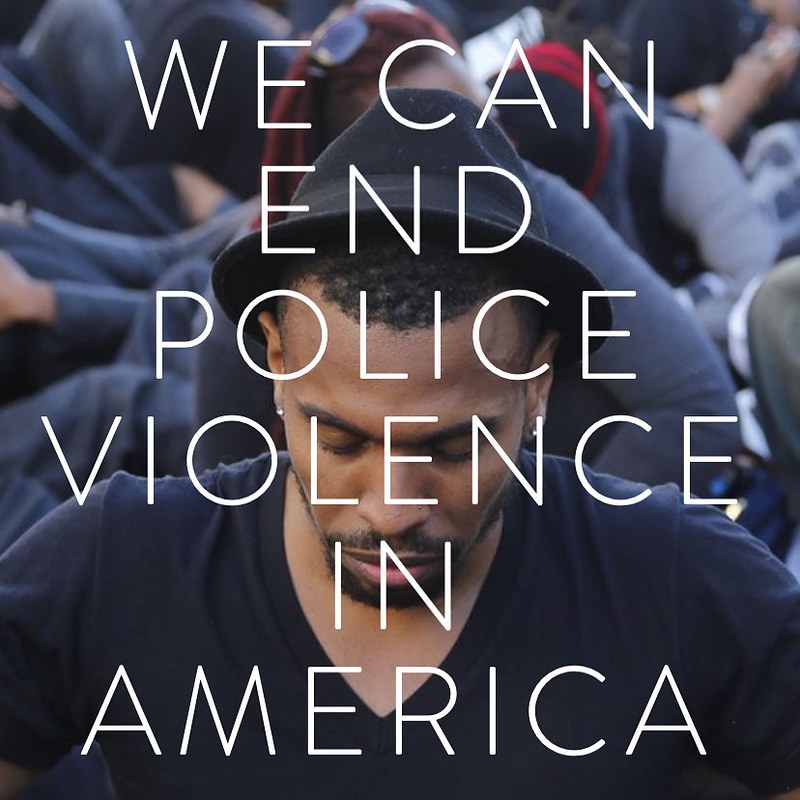Opinion: Amherst’s Community Safety And Social Justice Committee On The Killing Of Tyre Nichols

Photo: flickr.com. Heidi De Vries, Campaign Zero (CC BY 2.0).
by Allegra Clark and Demetria Shabazz
Amherst’s Community Safety and Social Justice Committee (CSSJC) issued the following statement on February 3, 2023 on the killing of Tyre Nichols.
Here we are again community, another Black life stolen by police and the culture of violence the institution engenders. You need only run a Google search to find headlines such as Time Magazine’s “Tyre Nichols’ Killing Is The Result of a Diseased Culture,” or The Boston Globe’s “Tyre Nichols and the Culture of Toxic Policing,” and the Associated Press’, “Tyre Nichols Case Revives Calls For Change in Police Culture.”
Part of this “toxic culture” is a deeply ingrained characteristic of control and fear built into the history and structure of the American policing system. What we accept as normative policing practices such as traffic stops often result in aggressive and sometimes deadly encounters for Black and Brown human beings. To create a shift in culture, we must examine the coerciveness of current public safety practices.
Here we are again with a 2020 finding that Black and Latino men are stopped more frequently than white drivers and that “Racial disparities are particularly notable in stops by police departments, where Black drivers make up about a third of traffic stops in the hours around midnight, roughly twice the share of white drivers.” What are we to do with “Black and Latino drivers” being more often searched during “nighttime stops, but discovery rates for contraband or evidence are lower than those of white drivers.” Can ongoing antiracist training help to mitigate deeply ingrained biases in policing and police officers? Can the legacy of slavery and racism in the US way of policing change? That is the critical question.
The facts and these questions make us wonder if we will experience a violent or deadly encounter involving our police here in Amherst. Are we relying on luck or policy and better community safety work? The town’s Community Safety Working Group (CSWG), sparked by the death of George Floyd at the hands of the Minneapolis police and the racial reckoning that followed, helped create a new department in town, Community Responders for Equity, Safety & Service (CRESS), to address community safety calls not involving violence. The cultural shift (for the Amherst Police (APD)) that the CSWG called for in Part A and Part B of their 2021 report (including developing antiracist culture, and policy changes to reduce interactions between police and drivers) has yet to be enacted and realized. This same cultural shift is again being called for nationally in the wake of the death of Nichols, a young black man stopped just blocks from his home in Memphis.
Part of the culture shift the CSWG requested was ongoing anti-racist training to change the Amherst Police culture. Recently Town Councilor Ellisha Walker proposed a motion, which the council passed after lengthy debate, directing anti-racist work to begin with the APD and go across the town departments. Training itself is not a guarantee of eliminating bias, but we in the CSSJC hope it is a step toward meaningful change.
The CSWG started the conversation about a new community safety vision, and we in the CSSJC want to continue that vision. This vision includes investments in the community rather than adding to the APD force or paying for expensive training sessions. For Black and Latino men, research shows that nationwide, each interaction with police increases the likelihood of having a negative and even deadly encounter. The incident with our youth this summer in which the APD told them they could not leave the scene and “had no rights,” is but one lucky instance (which did not result in serious physical injury?) thanks largely to the children and some self-restraint by APD officers. To move forward, we must adopt all the CSWG recommendations and continued by the CSSJC which are intended to reduce the size and scope of policing in Amherst.
The Office of Diversity, Equity and Inclusion (DEI), the Resident Oversight Board, the Multicultural Center, and the BIPOC Youth Empowerment Center are part of this vision of a safer community. Our goal as a community should be to develop resources that will transform our safety infrastructure away from one focused on criminalization and surveillance to one focused on community health and investment. This local vision is supported by national research on “Community-Based Violence Interventions,” that prioritize “intervention programs to reduce gun violence and violent crime more broadly.” An investment in public infrastructures allows for the implementation of community-controlled and community-run alternatives to crime prevention, including broad investments in local programs concerned with health, housing, education, youth, and harm reduction. These are worthwhile and mutually beneficial places to invest in as a community as the APD lessens its presence in not only areas of public safety but also traffic stops.
The vision of the CSSJC, once embraced and fully enacted, is the positive cultural shift Amherst needs to finally recognize the power and humanity in all of us, opening the possibility of restoring the trust that can lead to healing within our community.
The CSSJC invites all to our next meeting Friday, February 10th at 6 p.m. to voice concerns, pose questions, or comment about public safety and equity in our community. See the Town’s website for the Zoom link to join. In addition, a joint listening session is planned in March for CRESS and the CSSJC marking a year since establishing the program.
Allegra Clark and Demetria Shabazz
Co-Chairs, Amherst Community Safety
Social Justice Committee

US police have killed nearly 600 people at traffic stops in the United States since 2017. This statistic underscores the urgency of removing police from traffic enforcement.
https://www.theguardian.com/us-news/2022/apr/21/us-police-violence-traffic-stop-data
A handful of communities have begun to institute the changes necessary to ensure that traffic stops are no longer lethal.
https://nondoc.com/2022/12/22/tragic-traffic-stops-have-led-to-reforms/